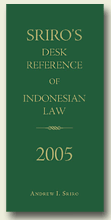An ASEAN deal for Myanmar
31 May 2005
Thang D. Nguyen, Jakarta
The word crisis in Chinese has two characters: The first means "danger," and the second "opportunity." This is how the issue of Myanmar's chairmanship of the Association of Southeast Asian Nations (ASEAN) should be dealt with, given Rangoon's obstinate posture on human rights, freedom and democracy.
Myanmar (formerly Burma) is scheduled to assume the chairmanship of ASEAN -- which is rotated in the alphabetical order of the ten member countries' names -- in 2006.
To be sure, Myanmar feels ready and able to assume this position. It faces objection, however, both from external forces and from within ASEAN, which groups Brunei, Cambodia, Indonesia, Laos, Malaysia, Myanmar, the Philippines, Singapore, Thailand and Vietnam.
The objection is grounded on Rangoon's infamous treatment of Nobel-winning activist and democratic leader Aung San Suu Kyi. Since 1989, the military has been putting her under house arrest.
Moreover, in 1990, Suu Kyi's party, the National League for Democracy (NLD), won a landslide election, but Myanmar's junta regime never acknowledged its victory.
The EU, for instance, has threatened to boycott the Asia-Europe Meeting (ASEM) if Rangoon did not free Suu Kyi and show democratic progress and continues to put pressure on Myanmar.
Likewise, lawmakers in several ASEAN countries, namely: Thailand, Malaysia and Singapore, have independently signed petitions calling on Myanmar to forgo the ASEAN chairmanship.
Under international pressure, ASEAN has, as a group, also called for Suu Kyi's release. During a gathering of its foreign ministers in Phnom Penh, Cambodia, in June 2003, ASEAN issued a statement urging Myanmar's military rulers to free her.
This was an unprecedented event because one of the key founding principles of ASEAN is the so-called non-interference policy, which says that the ten member countries will not comment on and interfere with each other's domestic political affairs.
But, alas, nothing has changed. Suu Kyi and her NLD colleagues are still under house arrest.
What is more, last October, Rangoon's hard-line leadership fired the then Prime Minister Khin Nyunt, who had drafted the country's "Roadmap to Democracy," which was supposed to culminate in free elections. This move has, of course, been viewed as another major drawback for democracy in Myanmar.
Thus, Myanmar occupied a prominent part of the discussion at this year's ASEM, which took place on May 6-7 in Kyoto, Japan. Foreign ministers from ASEAN+3 (Japan, China, and South Korea) countries and their EU counterpart called for "a sense of urgency" on Myanmar's democratic reforms, but stopped short of coming up with a concrete action or solution.
Even though as a group it has publicly asked Myanmar to free Suu Kyi, the main obstacle for ASEAN in dealing with Rangoon's ruling regime is the non-interference policy.
Rangoon knows this and has thus been, and still is, able to play a cat-and-mouse game with ASEAN on the basis that Suu Kyi's freedom and democratic progress in Myanmar are -- and rightly so, according to the non-interference principle -- its domestic political affairs.
Now, what to do?
It seems that no one single country in ASEAN can single-handedly solve the Myanmar problem. Therefore, it calls for a collective, consensus-based solution.
The solution is for ASEAN to arrange a private gathering of foreign ministers from all ten member countries to lay out a simple proposition: If Myanmar wants to keep the chairmanship of ASEAN next year, it must release Suu Kyi and allow for the "Roadmap to Democracy" to resume; if not, the chairmanship will go to the next country in line -- which would be the Philippines.
To give this deal some teeth, the majority of the ten member countries must agree on it and set a deadline by which Myanmar has to submit a response to the proposition. If needed, a majority-rule vote is one way to obtain consensus among the member countries on the proposal.
Interestingly enough, on May 7, the second day of the ASEM meeting in Kyoto, three bombs exploded at two shopping centers in Rangoon, killing 11 people and wounding 162 others. Both the ruling regime and Myamar's rebel groups have denied responsibility for the attack.
Regardless of who was behind the blast, it gives ASEAN another reason with which to pressure Myanmar. In fact, it makes sense not to have Myanmar hold the ASEAN chairmanship next year because security is a must for the grouping's various meetings throughout the year in the country.
Myanmar might very well argue that the bomb attack is a matter of its domestic politics and, therefore, ASEAN should not be concerned about or interfered with it.
ASEAN's response should be: When a domestic issue, such as the safety for the group's leaders and meetings in a host country, is at stakes or endangered, it affects each member country and the group as a whole. Thus, it is no longer a domestic issue with which ASEAN may not interfere.
Alternatively, Myanmar may use the bomb attack as an excuse to forsake its chairmanship of ASEAN and, thereby, saves face.
Whatever choice Myanmar may make, ASEAN does have an opportunity to push it to free Suu Kyi. And it is an opportunity that ASEAN should not miss.
The writer, a former regional manager for Asia at the World Economic Forum (WEF), is a Jakarta-based columnist.

















